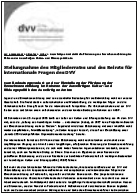
on the occasion of the loss of significance and end to funding of adult education in the framework of the Foreign Cultural and Educational Policy (AKBP) of the Foreign Office.
Youth and adult education are vitally important not only for the development of our society; they occur in both extra-curricular and continuing education contexts, the most important providers being adult education centres. This is also true internation ally. Adult education centres and the German Adult Education Association (DVV) have for a number of years made a decisive and acknowledged contribution within the framework of Germany’s Foreign Cultural and Educational Policy (AKBP).
In a communication dated 25 August 2006, the head of the Cultural and Educa tional Department of the Foreign Office informed the DVV that the “administration of the Foreign Office…(has) decided to no longer fund projects in the area of adult education starting in 2007”. The only reason given for this decision was that it was simply a matter of “prioritising” “when money is tight”, based on “an audit carried out back in 2004”.
The international advisory board of the DVV cannot understand this decision and calls on the Foreign Office to adopt a more measured approach in view of its longstanding and successful funding of adult education and the agencies involved, who do not hide behind formal argumentation but are ready to enter into a profes sional dialogue. The outcome of this must bring about a change of decision and lead to a return to the trusted partnership enjoyed as part of the AKBP.
For more than three decades, adult education centres, their regional associations and the DVV, with the support of the Foreign Office, have worked alongside European and international adult education agencies at national, regional and local levels. An excellent example of this is documented by the Adult Education Association in Hesse, whose longstanding partnership with Slovenia has seen through changes occurring in that country with constructive measures at various levels. Likewise, there is a long history of collaboration between adult educators in Thuringia and Turkey. The adult education centre in Stuttgart received support in its efforts to cross-fertilise intercultural approaches by means of international partner ship projects in Germany and partner countries. In Hamburg, the adult education centre successfully became involved in the Baltic cooperation project with the sup port of the Foreign Office. At very little expense, the notion of ‘cultural dialogue’ as expressed by Germany’s Foreign Minister Frank-Walter Steinmeier in his opening address to the “Moving people – culture and education in German foreign policy” conference in October 2006, was implemented in a practical way.
Many examples can be found of the way that the international work of the DVV has been directed in recent decades at foreign challenges. Examples of this are the active taking up of contacts at all levels with partner organisations in Eastern Central and Eastern Europe after the fall of the Iron Curtain, as well as the contribu tion made by adult education centres towards reconciliation, understanding and coming to terms with the past in South-East Europe. The Foreign Office has always been an open and accommodating partner in this. In Afghanistan too, it has sup ported our longstanding involvement and our European-Islamic cultural dialogue, by means of which the rich experience gained from German adult education in its work with migrants was put into successful practice. The DVV has proven to be a flexible and competent partner of the AKBP, always ready and able to respond to new challenges.
In its list of objectives and tasks in relation to AKBP, the Foreign Office rightly formulates its cornerstones and guidelines as: “contributing to the prevention of worldwide crises and conflicts”; “promoting European integration”; and “dia logue between peoples”. Without question it is not possible to achieve these aims by solely addressing elite groups, as important as these are in a cultural and economic-political context for Germany. In encounters with the Islamic world it has to do surely, but not exclusively, with a pluralistic platform that includes all groups of the population, “to which interested people of the most diverse kind can align themselves”, as Foreign Minister Steinmeier urged in Berlin. It clearly goes without saying that maintaining specialist contacts at various levels is the most appropriate way to be involved. It would therefore seem to be at best negligent to throw out a proven and effective tool that the Foreign Office itself has evaluated as positive for a long time. Rather than divest itself of important experience and skills, the Foreign Office should realise and use the diversity and potential of adult education – this goes also for the way in which providers compete to raise the quality of education provision, for which organisational diversity on the ground is a prerequisite.
For the reasons stated, the international advisory board of the DVV does not understand the decision of the Foreign Office to put a stop to its funding of adult education in the framework of the AKBP. The reference to “money being tight” cuts no ice in view of the small fraction of the AKBP budget involved as well as the increases in other areas. Set against this is the wide-ranging and successful work described in the stocktaking document, “Adult Education and the Foreign Office’s Foreign Cultural and Educational Policy: Necessity and Opportunity”, issued in July 2005 by the DVV’s Institute for Cooperation:
“The AKBP’s relatively modest budget is producing very good results, with more than 30 individual projects successfully carried out within the 2004 budget of EUR 120,000. Moreover, partners involved have been able to mobilise co financing for many of the projects. Above all, the fact is that the German funds made available enabled technical initiatives to attain a quality that could then be channelled into European-wide co-operation. Our projects for inter-cultural and inter-religious dialogue serve as shining examples of this.”
Stuttgart, 4 December 2006
Source: www.dvv-international.de

DVV International operates worldwide with more than 200 partners in over 30 countries.
To interactive world map